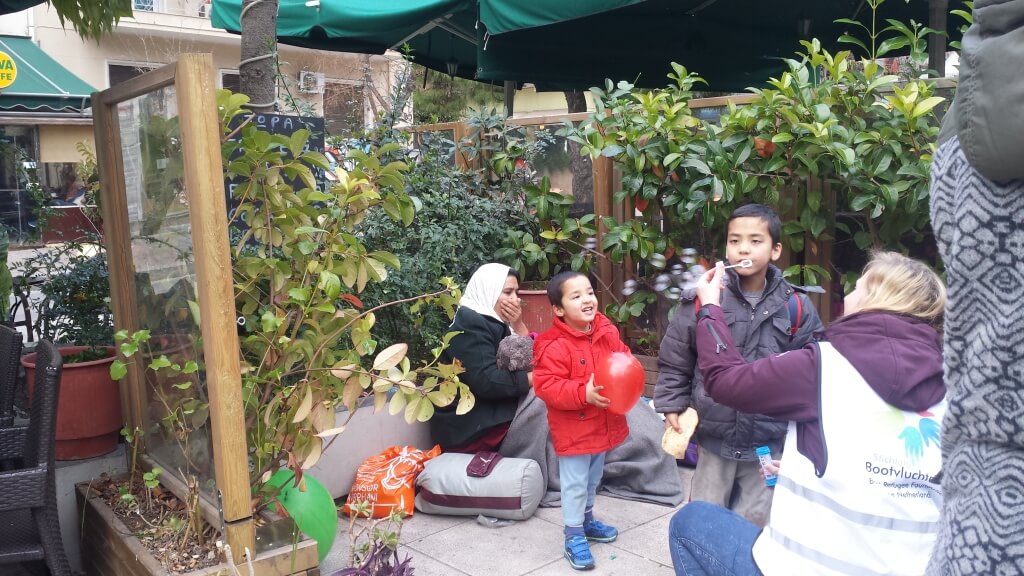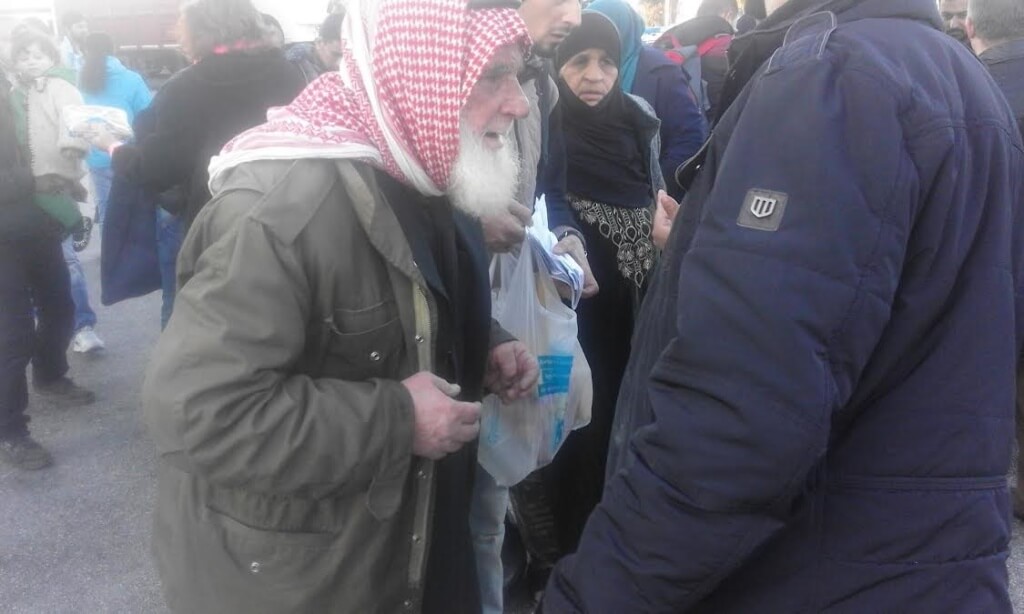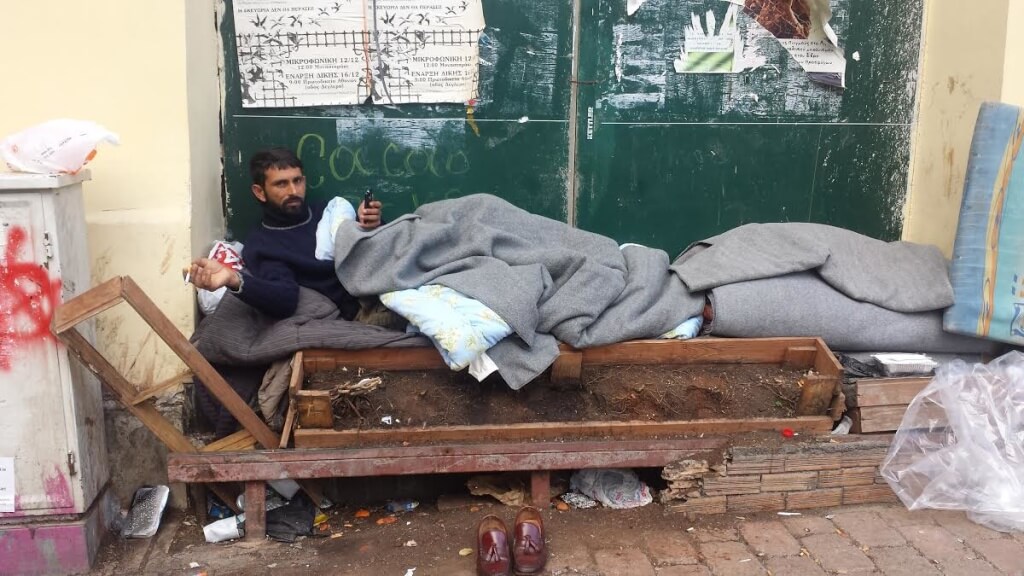1.
John is thirty-five. He fled from Nigeria to escape Boko Haram. On the main square of the Exarchia district in Athens, famed for its links with anarchists, he sells DVDs. He has Star Wars and the newest Bond film. Business is going ok, but he says that he is happy because he has a job. Alom is in his fifties. He fled from Bangladesh to escape poverty. He sells lighters and incense. I don’t know where Ahmen is from, or what he has fled from because he doesn’t speak English. He is in his forties and has strange scars on his cheeks, as if someone sliced him with a knife and the wounds did not heal cleanly. He sells socks. The majority of money they make goes to a wholesaler. I don’t know what is his name and where he comes from. Probably Greece. He sells them these products, which he buys in bulk from China. We will probably never know the names of the workers who pack them into the plastic boxes. Vasile is an eleven year old Romani boy. He wanders around with his brother, and collects garbage, which has been tossed away by the tourists and locals: food, clothes, everything which other people think is no longer needed. “This is about dignity, ours and the immigrant’s. Why does Europe not do anything to help us?” Thassos, a teacher in his forties, asks as we smoke together, sitting on the steps in a small Athenian street. I don’t know what to answer. We smoke and admire how for the first time this year, the warm sun is shining.
“This is about dignity, ours and the immigrant’s. Why does Europe not do anything to help us?” Thassos, a teacher in his forties, asks as we smoke together, sitting on the steps in a small Athenian street.
2.
Alexis is two meters tall, has a pitch-black beard and looks like he came straight from a German refuse dump. His father is Greek, his mother, German. He is the product of a summer love affair. He has his mother’s family name and in Germany his friends call him Johann rather than Alexis. In Berlin he lived in Neukölln, the hipster district. He has been in Greece for three months. His main aim is to learn his father’s language. Janice is the only one here who can pronounce my name correctly. It’s because her grandfather’s name is Julian. He and his twin brother, Maciej were Polish miners near Lille. Although Janice is from Paris, she has lived here for a year and half. She earns money by giving French lessons as well as receiving French unemployment benefit. She is involved with one of several groups operating in the squats in Athens as well as a feminist organization. She believes that in countries with macho culture such as Greece, feminist groups are much needed. Dick is from Sweden. He has lived here for five years. He has a girlfriend from Athens, but he doesn’t speak Greek. He believes that this is because he travels a lot. He works as a manager and roadie of various bands, mostly American, which can account for his American accent. We meet by chance, at around midnight at a table in a pub on the main square of Exarchia. The bartender throws us out as they are already closing the bar. When he hears that I’m Polish he clutches his head in sympathy and makes funny gestures: “Oh, your government, your government oh, I’m so sorry, so sorry.” He pats me on the back and it’s quite funny really. Despite this, he still throws us out, and we finish off the night in “Micro”.
3.
– “Varufakis? Who the fuck is Varufakis, that fucking TV star. With Tzipras in charge they couldn’t fix anything here, so he left Greece and now he’s ballin’ around Europe, pretending to be a savior,” declares Chara, a woman of around 40 with a pierced nose, who is a bartender at a pub for communists. “I used to be an anarchist, but now I have kids so I have to earn money and you can not squat forever: women here sell themselves just for food. Just look and see how many people here look for food in dumpsters”. She does not stop ranting, even as Musa arrives. He is in his thirties, is from Dakar, wears counterfeit Ray Ban shades and has lived in Greece for seven years. His name basically translates as Moses, which means “rescued from the water”-a very apt name, considering how he reached Europe. He sells African crafts. “Paris-Dakar, Paris-Dakar”, he repeats, as he shows me a model of a motorbike, made of wood and bamboo, which is on sale for fifteen euros. He has braided leather belts and a small djembe hanging on his back. He tells me to open a wooden box, which he has taken out of his pocket. Inside there’s another one. And then another, and another. We open them until we reach the fourth. We laugh and it is all very pleasant but nevertheless I decide not to buy a red, hand-carved elephant figurine for two euros. He won’t sell much to communists. “Rich people drink on the other side of the square, go there,” advises the barmaid. “They will buy your stuff, we’re poor, just like you,” Chara concludes bitterly. Ironically, her name in Greek means, “joy”. “You are a nice guy,” Musa smiles at me then goes with his goods to the other side of the street. In the background you can hear clearly “Richest Man in Babylon” by Thievery Corporation playing.

4.
I meet Key on the plane. She’s twenty-eight, has dyed grey hair, a bright yellow sweater and she’s very, very pretty. “I do magic,” she replies, when I ask her what she is doing in Athens. She’s a graphic designer and designs special effects for games, movies and commercials. Six months ago, she came from the Ho Chi Minh City in Vietnam to the Greek capital via Singapore and London. But the homeland of Pericles and Phidias is not really to her liking. “Everything is loud and chaotic. People cross the streets when there’s a red light and the men are terribly chauvinist. It’s not the country for me.” Halandri district, where we go to grab a beer, is a world away from Athens, which is populated by the homeless and migrants. Everyone here looks happy and prosperous. I spot Tally Weijl, Häagen-Dazs, masses of chain stores, a small picturesque church and Roma women in patterned shawls selling flowers. An island of Wealth in a sea of chaos and misery. Full of brand-new bikes and beautiful people: a Brave New World. Although in February it is ice cold here. Key flew back to Athens from Warsaw in order to close her affairs at work. In three months she is going to start working for a Polish corporation. She’s optimistic. “No one will consider me a slut because I use Tinder. Not like here, in Greece,” she tells me enthusiastically, and I nod in agreement, though tentatively.
5.
The farmers have been protesting for several days on Syntagma Square. The new government, following rulings of the Troika (The European Commission, European Central Bank and the International Monetary Fund) raised the insurance and pension contributions three times. “My aunt has seven hectares and a garden. How she can find money to pay for it?” asks Charista, a nice girl with curly hair, who gives me some cigarette rolling paper. Michalis, an actor of about fifty, tells me that he is very fond of Poland. “I worked there at the Grotowski Institute. Is Ludwik Flaszen still alive?” When I say “yes”, Michalis is very happy. “I like that guy and I only have good memories from Poland”. Since the crisis began, he had to switch to trading olives. “I’m not an actor any more. I’m no-one,” he tells me with sadness. “I am not a nationalist, but I want us to go back to the Drachma – staying in the Euro will strangle us here,” he says. “My friend, a fisherman from Crete, has been hammering into my head from the start– remember, Tsipras is no Jesus Christ. You will see, it will be the same as it has been. I didn’t want to believe him so I voted for SYRIZA. Now I can see that he was right.” A tiny old man, maybe 1.5 meters tall and about eighty years old, is walking between the tables and trying to collect money for food. He hobbles over slowly with a cane and speaks falteringly in Greek and English, “Can you help me, can you give me one Euro?” He has greasy, gray hair and looks like a dry, wrinkled muffin. When he shuffles out of the pub, I see on the back of his cap a Nike tick and the words “Just do it”. Outside, tourists drink frappes. It’s 18 degrees Celsius, and you can already feel the warm rays of the spring sun.

6.
The house where I’m living is near Attiki station. You can find drug pushers there. These guys do not respect the first trade rule of drug dealing – do not consume your own merchandise. They are high yet cheerful, although I would not say that arouses any sympathy. Alexis is about my age and is terribly high on meth. Barely able to stand on his feet, he shuffles, gasping with a dripping nose. As he is walking down the stairs into the subway, I really hope that he will not fall, because I’ll probably be the only person to help him. His eyes are half-closed, he shuffles his shoes, but somehow he manages to get to the platform. “I had an argument with my parents, oh, oh, I live here”, he vaguely points somewhere in the air as he sits down next to me, panting. “Do you like techno?” he asks. I’m not sure whether he is asking me or someone else, because his eyes are still half-closed. “I’m into psytrance music. What do you like?” he asks. When I mumble “jazz”, just to say something, he asks again, “Techno?” “Techno”, he replies to himself and nods. He seems to be dozing, but then he starts a broken narrative, enquiring whether a gig will be free and that he is going to a party. He is surprised that I’m going for a beer alone. “Maybe I’ll go with you?” he asks. I refuse politely. When I roll him a cigarette, I notice that he has a tattoo on his wrist: two Chinese characters and a classic, old-fashioned bomb that has just exploded.
Throughout the journey they used bowls to pour water out of the dingy, and prayed that the boat wouldn’t burst.
7.
Sanjar is about thirty-five. He is from Lahore and has has two children. He shows me a picture of them on his mobile: a son and a daughter. He, along with his colleagues, the shopkeeper Ater, Ikbal the clerk, and Halid the artisan, have been sleeping under the olive trees on Omonia Square for the past month and a half. They paid 2500 bucks each to be smuggled into Greece. First of all, they passed through the mountains from Pakistan to Iran by foot, and then three days later they crossed over the green border into Turkey. Although perhaps it was more white, as the highest peaks are 5000 metres high and in December they are completely covered with a deep layer of snow. Not far from there is the biblical Mount Ararat; the place where Noah’s ark supposedly settled. They spent twenty days in Turkey waiting for a good opportunity to travel to Greece. The smugglers brought them to the beach and showed them a light on the horizon. “That is your dream land, the European Union. The shore of Lesbos is 30km away.” “You’ll be the captain,” one of them said to an older Syrian, and gave him control of the dingy, before disappearing into the darkness. There were sixty of them in the rubber boat. Throughout the journey they used bowls to pour water out of the dingy, and prayed that the boat wouldn’t burst. However, on the shores of Lesbos it did. Many unfortunately drowned and their bodies were collected from the beach by Oz Katerji and volunteers from www.helprefugees.org.uk.
In Lahore, Sajar had a shop, but since the military junta was overthrown in Pakistan, there has been a severe economic crisis; so severe that that people there are barely surviving. He was working 14 hours per day but as he was the only one working in his family, he did not earn enough to provide them with a decent living. The mustached Halid crafted knives and swords. He even spent a few years in the US; in Brooklyn and Memphis, but he was deported. He shows me his website: www.mbknife.com. They had all sold everything of value they had before they went to Europe. They want to go to Portugal as there will be work there harvesting. “They’ll give us 20 euros per day, but the question is, how do we get there? All of the borders are closed,” Sajar says. We sit in silence, watching Afghans trying to push hash mixed with aspirin and cocaine to tourists. I wanted to say goodbye to them before leaving, but they were already gone. “Work out, far, far,” one of their friends told me in broken English, waving in an unspecified direction. As I was going home I passed a cheap bistro, which was still open at 23:30. Through the stained glass I saw an old fat Greek man sitting at one of the tables, singing and shuffling something in his hand, which to me, as a Pole, looked like a rosary, but I guess it could have just been a simple bracelet.
![Political Critique [DISCONTINUED]](http://politicalcritique.org/wp-content/uploads/2015/09/Political-Critique-LOGO.png)
![Political Critique [DISCONTINUED]](http://politicalcritique.org/wp-content/uploads/2015/09/Political-Critique-LOGO-2.png)

this article is full of factual mistakes and at least 3 of the people did not give consent to be named and included in this. sneaky journalism like this means that no journalists can be trusted.